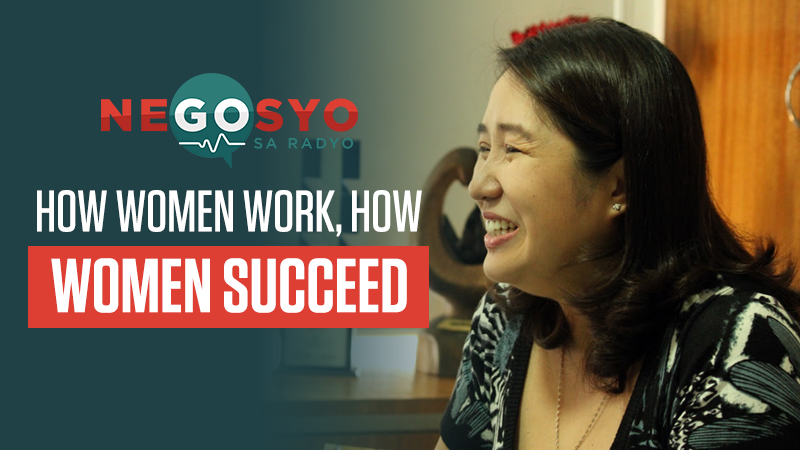
by rossanahead | Apr 4, 2017 | career, gender equality, woman
Women have worked their way up the corporate ladder in many industries. Gone are the days when women stay home and just do household works, today women are excelling in many fields and have been viewed as important contributors in the workforce. So the challenge sometimes isn’t so much to find job openings but to find the best careers that will help you achieve your #LifeGoals. We’ve listed up five careers that suit our modern day super Filipina.

IT Services
IT services made its way to the top of Jobstreet’s list of highest-paying jobs in the Philippines in 2016. Although the industry has been traditionally dominated by men, women are seen to be slightly dominating the science and technology industry in the Philippines according to an infographic released by Rappler in 2014. This means that women are not having such a tough time entering a male dominated industry that pays such high wages. Even those with minimal experience can sign contracts with their salaries reaching 38,000 pesos. Not bad, right?
Law/Legal
As we see in television and movies, learning legal matters may be a pain in the neck. This may sound like a cliché, but hard work does pay off! Law/Legal profession also made its way to the list of highest-paying jobs in the Philippines. It also shows that we have an equal amount of men and women in this industry. So to all women law students reading this, hang in there! Your sleepless nights and bottles of coffee will pay off when you enter the workforce.
Human Resource
Society has traditionally aligned women’s choice of career to social sciences or anything in the liberal arts and women have constantly tried to break away from this stereotype. But if your heart is happier in the management of workforce, no judgments! Human resource is a career not only dominated by women, by 72% but also one of the jobs that will surely offer big compensation package. In the Philippines, it is recorded that a Human Resource manager earns up to about an average of 65,000 pesos.
Financial Services
While people expect women to be good at management related jobs, very few expect them to be good at math. Don’t let that judgment hinder you from getting the huge compensation that finance industry offers. If you’re really bad at math, though, no worries! Services in the financial industry also encompass strategists and the like, which a lot of our smart women are good at. This is clearly evident because in 2014 about 69% of the workforce in this industry is women.
Public Relations, Marketing, Advertising
Women have always been creative, what a better way to use this creativity than to turn your passion into your career! Public relations placed 6th in the recent Jobstreet Salary Report for 2017 of highest-paying jobs, while advertising and media planning was at 10th and in these jobs, women have dominated by 62%. You’re not only using your creativity as your life career, as a bonus you also get good pay for it! Jobs in this industry has a salary range of 24,000 to 26,000 for those who have minimal experience. Nice deal, right?
Many job openings come and go in the Philippine job market but no matter what career you choose, always remember to love what you do. It’s when you choose the career you love when you get the greatest return. Because a modern-day super Filipina is not only smart but also passionate!
Written by Love Gardose

by rossanahead | Mar 22, 2017 | business, Business Tips, Existing Business, gender equality
 The Asia-Pacific Economic Cooperation (APEC) is leading the drive to help more women entrepreneurs in the region, including those in the Philippines, gain entry into the global marketplace.
The Asia-Pacific Economic Cooperation (APEC) is leading the drive to help more women entrepreneurs in the region, including those in the Philippines, gain entry into the global marketplace.
Small business promotion authorities from APEC member economies are taking the next steps to ease bottlenecks hindering women-led exporters and their growth and job-creating potential in the Asia-Pacific, the APEC Small and Medium Enterprises Working Group said in a statement.
The group detailed plans to expand efforts to tackle gender bias in trade during recent meetings in Sydney, Australia. These include greater cross-border training and technical exchange to enable reforms that aim to level the playing field for women-owned and managed firms in APEC economies, and improve their access to international markets.
“The move could increase trade-driven growth and job creation across a range of businesses—from a successful hand-loomed fabric producer run and operated by women in Philippine villages, to an emerging technology company started by a Peruvian woman that helps disabled people to communicate via instant messaging, to women-managed suppliers of materials and parts in Viet Nam that support manufacturers in Australia, Japan and the United States,” said the statement released March 22.
“APEC economies are deepening cooperation to break down barriers to the development and competitiveness of women-led businesses,” explained Nguyen Hoa Cuong, chair of the working group.
“Our work to address inequalities facing women entrepreneurs and managers stands to boost trade and growth, particularly among small businesses that account for the majority of employment across the region,” noted Nguyen.
The focus is on lowering institutional and policy barriers to participation in trade by women-led businesses. Examples include outdated labor laws that fail to sufficiently protect women, a lack of childcare services, limited availability of credit, and inadequate or out-of-reach higher education and skills development opportunities.
To address these challenges, APEC is increasing public sector capacity to introduce gender-responsive trade promotion policies and programs, in coordination with the business community and civil society. Training and information-sharing sessions for trade promotion officials, to be held next month in Ha Noi, Vietnam, will take this multi-year, region-wide initiative forward.
“Women-led small and medium enterprises can better tap into international business and global supply chains when they are supported by government policy and practices that tackle gender specific constraints faced by female entrepreneurs,” explained Cynthia Balogh, director of Women Going Global, the chief trainer leading the team overseeing the project. “The incentives for job creation and growth in the region are potentially huge.”
This work is complemented by measures taking shape in APEC to widen access and use of e-commerce by women-led micro, small, and medium enterprises, helping them reach customers and business partners abroad.
Opening up financing avenues, branding, intellectual property protection, and management support are further areas of emphasis.
“Women in the Asia-Pacific are major drivers of small businesses with great exporting potential but may be constrained by unsupportive economic and social policies,” said Hoang Thi Thu Huyen, chair of the APEC Policy Partnership on Women and the Economy.
“Reform is key to realizing more gender balanced trade that benefits everyone. It is also critical to transforming attitudes that remain the bigger obstacle to women’s economic empowerment,” she added. – Romelda C. Ascutia
Photo: Asian Development Bank
Featured Photo from Agriculture.com

by rossanahead | Mar 9, 2017 | gender equality, woman
Today is International Women’s Day and what better way to celebrate it than to give tribute to all the hardworking women in the world.
For the longest time, society has dictated what women should do, where they should work, what they should wear and where they should go. That’s not the case anymore. Today, women are working their way up in male-dominated fields.
More and more women are occupying the highest seats in the biggest companies in the world.There are also iconic women rising to the top of public service. And incredibly, women are slowly being known as great influencers.
Smartsuperwomen.com was created in 2011 to help women from all walks of life reach their fullest potential. To celebrate its 7th year, this website will be improved and re-launched to meet the needs of more women in different fields. So whether you are a mother, a working woman or an entrepreneur, smartsuperwomen.com will be here to help you. It will also continue sharing stories, tips and informative articles which can serve as a woman’s guide in everyday living. These changes in the website represent the progress women have made throughout the years.
So cheers to all mothers, women in the corporate world and the business industry. Cheers to female public servants, influencers and doers. You are the reason why we celebrate today.
Featured Photo by Josh Howard on Unsplash

by rossanahead | Mar 6, 2017 | business, career, Education, gender equality
Written by Susan Agustin, Go Negosyo
To kick of National Women’s Month, Go Negosyo sa Radyo aired a femme-powered episode on March 1 with two phenomenal women entrepreneurs as guests. Hosts Sen. Bam Aquino & DJ Cheska San Diego-Bobadilla were joined by Emma Imperial of Imperial Homes and Rossana Llenado of AHEAD Tutorial and Review Center. Both have been previously awarded by Go Negosyo (Imperial in 2015 and Llenado in 2016) for being women entrepreneurs worth emulating.
On March 30, Go Negosyo will award another batch of women in the Inspiring Filipina Entrepreneur Awards 2017 which will be held in the prestigious Malacañan Palace. Much like Imperial and Llenado, the women who will be given recognition are those who have sparked significant progress and inspired change in the entrepreneurial community.
Sen. Bam and DJ Cheska began the episode by setting the tone for the listeners. At the end of the hour, they hoped to have uplifted the listeners and opened their eyes to the nuances of women entrepreneurs’ experiences.

Imperial Homes Group of Companies
Emma Imperial was the first to share her story. She is a well-decorated and respected CEO in the realty industry wherein her male counterparts mostly dominate. Imperial shared that at the onset of her career, she had to prove herself as someone worth paying attention to. “Big developers are usually male and the engineers that work for me are mostly male as well.” Despite these odds, Imperial has managed to lead her company to becoming well-recognized globally. With recognitions under her name like Biz News Asia 2016 Entrepreneurship Awardee and Filipina Women Network’s 100 Most Influential Filipinas 2015, it is an understatement to say that Imperial is at the top of her game.
Likewise, her company is equally laudable and has even received international attention. Imperial Homes Group of Companies was awarded by the CEO Asia Awards 2015 as the ADEC Innovation Green Company of the Year, certified by IFC-World Bank Excellence in Design for Greater Efficiencies (EDGE) for Green Building, and recognized by the Financial Times in 2016 as a nominee for the Transformational Business Awards. “You don’t have to be big to be counted in the global community. It’s about innovation and how you believe you’ll help your country; it’s not about the size but the idea,” Imperial shared.
Her big idea manifested when her company decided to construct solar-powered small houses. It was for them, a way to address the backlog of housing in the country as they were low-cost and efficient. In a country where solar power is somehow relegated to more expensive projects, Imperial homes saw the potential for them to be ideal for the provinces where brownouts were frequent. The switch to solar meant that these areas would never have to suffer from power cuts and solar at scale would actually be energy and cost efficient. It was a revolutionary idea: solar power for low-income families. After her company started this project, many took notice. “Ginawa tayong poster child ng World Bank,” Imperial proudly says.
With her story, Imperial wishes to impart to other women entrepreneurs that working in a male-dominated business doesn’t have to be a struggle. Although you have to prove yourself worthy at first, she shares that strict implementation and being consistent with your policies ultimately makes others listen. She’s proud that her organization is now seeing a lot of interest from the youth because the youth she says, are intrigued by innovation (like Imperial Homes solar-powered low-cost houses)
Not to take away from the men in her industry, but Imperial shares that she believes women have more heart than men. “ I had more chances to make my business high-end, but I chose to cater to the low-end group. I can also honestly stop doing business now and I’d be okay but I can’t stop because of my employees.”
She also shares that it’s important for women in business to have camaraderie. She shares that when she was starting in her industry, it was hard to be part of bigger projects because the men would already have a so-called “boys club” and she would be left out. Today, she happily shares that women entrepreneurs have already set-up similar groups to support each other and they often meet about projects related to nation-building.

AHEAD Tutorial and Review Center
Rosanna Llenado was the second guest who shared her story and insights on what it means to be a successful woman entrepreneur. She was named as one of the 100 Most Amazing Filipinas by Summit Media in 2012 and received numerous awards from the Philippine Marketing Association, Philippine Chamber of Commerce and Industry, and Entrepreneur Magazine. Her business, AHEAD is one of the most venerated tutorial and learning centers in the country. As one of the first tutorial centers to offer college entrance exams review programs, Llenado eventually expanded their services to offer a wide range of programs to complement students’ learning.
Recently, they’ve put a center that focuses on teaching Singapore Math— a method that she believes is more functional and practical which eventually makes student’s more proficient at the often dreaded subject. They’re also offering courses on speed reading and mind-mapping which are valuable skills for any student tackling difficult and lengthy reading materials. From a small business started at her home, AHEAD has now risen as the go-to tutorial center in the metro because of its quality and comprehensive programs that position students for excellence.
When Llenado was asked about her opinion on Filipina entrepreneurs, she says that a lot of Filipinas are still scared to enter into business. But what most Filipinas don’t know, she said, is that we’re relatively lucky compared to women from other countries. She discovered this fact when she conducted a research on women entrepreneurs across the world. She found out that the Philippines was ranked #5 on the list of women-friendly countries for business. She further shares that there are some countries wherein women aren’t allowed to have properties or businesses registered to their name and would have to put them under their father’s or husband’s.
She recognizes that there are a lot more women entrepreneurs now compared to when she first started AHEAD. But she says that despite this increase, women will still encounter struggle or discrimination, especially when they’re just starting out. “I also had an experience when I struggled with doing business as a woman; I was invited to do business with these group of guys.
I noticed one of the men was trying to pulling one over us, and I called him out. They eventually met without me and kicked me out. True enough, that man I called out did deceive all of them.”
Despite the welcome positive change of more women entering business, Llenado wishes however, that more women in our country would hold positions in different boards. She noticed that most board of directors and trustees are still predominantly male. “Women can lead. We’ve had two women presidents! And in the senate and company presidents, ang dami rin babae.” So, why should the boards be different, right?
Llenado and Imperial’s stories are just two amongst a plethora of inspiring success stories of FIlipina entrepreneurs. They are a testament to the woman’s ability to lead and succeed. So, if you’re a woman, currently aspiring to turn that business dream into reality, but afraid to start, here are choice words from our two guests yesterday:
“Do things for the greater good of the country. Imperial Homes never really intended to become a social enterprise, but because we had the heart to think of the communities that other competitors weren’t thinking of, we were able to distinguish ourselves from them. We profited of course— but that naturally follows when you do good work” – Emma Imperial
“If you don’t know where to start, ask yourself— whats the right business for me? ano ang kailangan ng kababayan ko? If you can answer these two and somehow the answer is one thing then that’s a good place to start.” – Rosanna Llenado

by rossanahead | Mar 1, 2017 | business, Business Tips, career, gender equality, Recent Posts
Times are definitely changing—for the better—for women. We can now aspire to be anything and everything we want to be, especially in the professional and business world, and we’re more likely to succeed too. Women have been elected president of a country, been named CEO of a conglomerate, become a much sought after motivational speaker or financial guru.
But, admittedly, it is still not easy for any woman who attempts to break the glass ceiling. The higher up the corporate or business ladder women go, the harder we’ll need to compete and prove ourselves in a still largely male-dominated world.
So how do you make it in a room filled with men? Here is a seven-point action plan you can adopt in your fight for recognition, promotion, or excellence in your chosen profession or industry.
Create a strategic plan. Don’t just passively wait to be noticed. Instead, map out a platform for success and then follow through with your plans. To find motivation, you can study the profiles and career trajectories of women achievers. For example, you can do research on Jessica Cox, a motivational speaker and pilot who was born without arms and who steers airplanes with her legs. Or look up the accomplishments of award-winning Dr. Josette Biyo, the executive director of the Philippine Science High School who has a planet named after her in recognition of her excellent body of work. In your own company, don’t hesitate to ask a close superior or director, both men and women, about their strategy as they moved up the corporate ladder.
Promote yourself. Think of yourself as a marketing expert who needs to introduce herself to a whole lot of people and who has to build relationships. Take on difficult challenges and risks to stand out and eventually get promoted. Consider also serving on board meetings to raise your visibility, and stay active in professional associations and search for leadership roles and responsibilities.
Be proactive. Don’t hinder your own growth by becoming complacent or content. Actively seek training, seminars, and workshops to keep learning professionally and improve your work or entrepreneurial skills.
Find work you enjoy. It may be a cliché, but doing work that truly gives you joy is half the battle. Look for a work culture that complements your strengths, limits your weaknesses, and is easier to endure in times of isolation. You are more likely to stay motivated in the face of gender-related hindrances when you are passionate about what you do.
Develop a plan to counter discrimination. Yes, intolerance still exists today, even in the workplace. Develop a plan to combat discrimination, but remember that not everything that may go against you is an attack on you, so choose your battles carefully. If you have trouble coping, it may be good to seek professional help or advice.
Have realistic expectations. Many women enter the workplace thinking that breaking new ground would be a breeze. When their expectations are not met, they give up or decide to settle for less. Learn to accept that not everything will go as planned, and prepare for setbacks by studying how you can stay strong as you strive to overcome opposition or failure.
Seek mentors. They need not only be your bosses or professional allies, mentors can also be friends and relatives of both sexes who have chalked up outstanding achievements. Look to them not only as individuals who can share their professional skills with you, but who can also introduce you to other people who can help you move ahead. – ED
Photo: UN Women

by rossanahead | Feb 19, 2017 | gender equality, Investment, woman
If you believe that it’s only in emerging economies like the Philippines that issues such as double standards, gender-related salary imbalance, and the glass ceiling still exist, think again.
Globally, in both developed and developing countries, “girls and women battle commonly held views and beliefs that limit their opportunities and potential,” including myths such as “women are better suited for baby-making than money-making,” says Katja Iversen, CEO of Women Deliver, a global advocate for investing in the health, rights, and well-being of girls and women.
“The truth is, women around the world are resourceful economic agents, overcoming persistent, gender-based barriers every day,” says Iversen in a recent article for the World Economic Forum entitled “7 Myth-Busting Reasons We Should be Investing in women.”
She adds that women have demonstrated they can build informal and formal businesses out of very little capital, create networks to maximize limited resources, all while shouldering the traditional responsibilities placed upon them, duties like child- and home-care.
“Women succeed in spite of laws, policies and institutions that hold them back, but it is a constant struggle. It is time to create supportive environments for women to thrive economically, and bust these myths once and for all,” she declares.
In her article, she cites several myths that continue to “rob women of their power to advance themselves, their families, their communities, and ultimately, their nations.”
The myth: investing in women doesn’t pay off
The truth: closing gender gaps will actually lead to an increase in global GDP
Iversen references a recent McKinsey Global Institute report that found that if women play an identical role in labor markets to that of men, as much US$28 trillion or 26% could be added to global annual GDP by 2025.
The myth: women’s income is not used any differently than men’s income
The truth: a greater percentage of women’s income is reinvested in their families and communities
This spending drives improved access to education, nutrition and healthcare, says Iversen. Evidence also shows that it is not merely a woman’s increased income, but rather her control over that income that helps her achieve economic empowerment.
A study in Brazil indicated that the likelihood of a child’s survival increased by 20% when the mother made financial choices. But Iversen notes that economic decisions by women are “intricately wrapped up” in cultural and social issues relating to gender, age, ethnic background, health or physical status, and overall social hierarchy.
The myth: women choose to work less than men
The truth: women shoulder a greater burden of unpaid work, and have fewer paid work opportunities
Women don’t work less than men; in fact, they often work more, Iversen stresses. The issue, she adds, is that their work is unpaid and often unregistered—rearing children and caring for the elderly rarely produces a paycheck. In some regions like South Asia, the Middle East and North Africa, women shoulder up to 90% of unpaid care work. “It’s time to balance the scales,” says Iversen.
The myth: inequality ends as women’s income increases
The truth: it’s giving women control over income that ends inequality
Iversen points to evidence showing that it is not merely a woman’s increased income, but rather her control over that income that helps her achieve economic empowerment.
“When a woman holds the strings to the family purse, that family is more likely to thrive,” she says.
She notes how Brazil’s Bolsa Familia Program, which is like the Philippines’ own Pantawid Pamilyang Pilipino Program but which provides cash transfers directly to the female head of households, was able to account for up to 25% of Brazil’s reduction in inequality and 16% of its drop in extreme poverty.
The myth: women’s groups are not necessary for economic development
The truth: women’s groups—including cooperatives, collectives, farmer groups, business associations, and trade unions—are often the only path to sustainable economic development for many women around the world
Says Iversen: “Women’s groups can offer a safe haven in which women of limited means can pool and maximize resources, manage risk, innovate and experiment, build skills and capacity, mentor and learn from one another, organize and advocate for rights, share care responsibilities, build confidence, and receive key information on everything from market information to nutritional guidance, family planning and reproductive health.”
The myth: family-friendly, gender-responsive policies are not worth the investment
The truth: In the US, every $1 invested in family planning results in $7 of savings; in developing countries like Jordan, $1 can result in as much as $16 in savings. The Copenhagen Consensus showed that every dollar spent on modern contraceptive methods will yield $120 in overall benefits.
In the case of the Philippines, the country enacted five years ago the Responsible Parenthood and Reproductive Health Act of 2012 (Republic Act No. 10354), or the Reproductive Health Law or RH Law, which guarantees universal access to methods of contraception, fertility control, sexual education, and maternal care. However, the law’s full implementation remains on hold as critics continue to raise strong opposition to the decree.
Iversen also comments that companies that invest in family-friendly, gender-responsive policies have found high returns on their investments, including reduced absenteeism and increased productivity.
The article says that harmful myths like these “continue to limit women as they seek careers, advance in the workplace, and seek access to capital—especially in the most economically disadvantaged parts of the world.”
It further observes that such myths do not just impede women on a personal level, they also hinder their collective progress. “The data and research above tell a different story about the exponential power of women. Growth is possible. Prosperity is possible. And it becomes a reality with women in the driver’s seat,” says Iversen. – RCA
Photo: Tamaki Sono




 The Asia-Pacific Economic Cooperation (APEC) is leading the drive to help more women entrepreneurs in the region, including those in the Philippines, gain entry into the global marketplace.
The Asia-Pacific Economic Cooperation (APEC) is leading the drive to help more women entrepreneurs in the region, including those in the Philippines, gain entry into the global marketplace.




